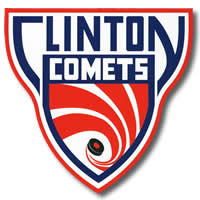History
Founded in 1927–28 as the Clinton Hockey Club and nicknamed the Comets in 1949, the team played primarily at the Clinton Arena from 1949 until 1973. The team was founded by Ed Stanley, who acted as manager, recruited local high school students as players, and provided financing for the team to buy equipment and take road trips. In the 1933–1934 season, the Comets played in the National Amateur Championship at Madison Square Garden against the Hershey Bears. The team also received support from Albert I. Prettyman, an athletic administrator known for bringing college hockey to nearby Hamilton College. The 1940 Winter Olympics were scheduled for Sapporo, Japan, but were canceled because of the start of World War II, as well as the hopes of Comets players Wilfred Goering and Art Scoones who were trying out for the Olympic team.
From 1954 until 1973, the Comets participated in the Eastern Hockey League, dominating for ten of their nineteen seasons. Most notably, under head coach Pat Kelly, the Comets posted a 315–208–64 (wins-losses-ties) record of eight seasons. During that period, in the 1967–68 season, the Comets produced an awe-inspiring 57–5–10 record. The Comets won the EHL playoffs in 1958–59, 1963–64, 1967–68, 1968–69 and 1969–70.
Later, when the team began playing games in the Utica Memorial Auditorium, it changed its name to the Mohawk Valley Comets and played in the North American Hockey League.
This page is based on this
Wikipedia article Text is available under the
CC BY-SA 4.0 license; additional terms may apply.
Images, videos and audio are available under their respective licenses.
